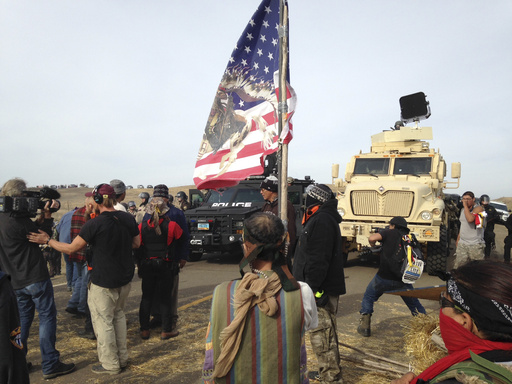MANDAN, N.D. — A legal battle involving a Texas pipeline company against the environmental organization Greenpeace is set to enter the courtroom in North Dakota on Monday. The case, which has significant implications for free speech rights, stems from protests that took place in 2016 and 2017 concerning the Dakota Access Pipeline, particularly during its proposed crossing of the Missouri River, an area that is near the Standing Rock Sioux Tribe’s reservation. The tribe has raised concerns regarding the safety of their water supply due to the pipeline, and numerous individuals participated in the demonstrations, with hundreds facing arrests.
The plaintiffs, Energy Transfer and its subsidiary Dakota Access, allege that Greenpeace International and its American counterpart, Greenpeace USA, engaged in acts of trespass, nuisance, defamation, and other offenses. The lawsuit also includes the Greenpeace Fund Inc., which is the organization’s funding branch. The trial, taking place in state court in Mandan, is projected to last five weeks.
Energy Transfer asserts that Greenpeace attempted to impede the pipeline’s construction, made defamatory statements against the companies involved, and coordinated protests that resulted in vandalism and violence. The company is seeking substantial monetary damages as part of their claims.
Since its completion in June 2017, the Dakota Access Pipeline has been actively transporting oil. Greenpeace International contends that it should not be implicated in the lawsuit due to its operational status outside the United States and maintains that its employees were not present in North Dakota or engaged in the protests. Greenpeace USA argues that the accusations made by Energy Transfer remain unsubstantiated years after the protests occurred.
A judge recently rejected Greenpeace’s attempts to dismiss or limit aspects of the case. Greenpeace representatives express that this trial stands as a crucial moment for the First Amendment rights regarding free speech and peaceful protest, especially under the current political climate. Sushma Raman, the Interim Executive Director of Greenpeace USA, highlighted the potential implications of the trial, stating that an unfavorable ruling could negatively affect the rights of journalists, protesters, and participants in public discourse.
Furthermore, Greenpeace USA facilitated “nonviolent, direct-action training” aimed at safety and de-escalation during the protests. Legal adviser Deepa Padmanabha criticized Energy Transfer’s stance, suggesting that holding trainers responsible for the actions of all protesters could discourage future peaceful demonstrations.
In a counter move, Greenpeace International filed an anti-intimidation lawsuit in Amsterdam against Energy Transfer, arguing that the company’s litigation is baseless and seeks damages for their actions. Meanwhile, an Energy Transfer spokesperson insisted that the lawsuit does not infringe on free speech rights, but emphasizes the need for lawful conduct.
The spokesperson, Vicki Granado, stated, “We support every American’s right to express their views and protest lawfully. However, when actions fall outside the law, we utilize our legal system.” Previously, in 2017, Energy Transfer unsuccessfully attempted to file a similar lawsuit in federal court, but the case was dismissed in 2019. Soon after, they pursued the current case in state court.
Founded in 1996, Energy Transfer began with 20 employees and 200 miles of natural gas pipelines. Today, the company has expanded significantly, employing over 11,000 individuals and managing more than 125,000 miles of pipeline and related infrastructure.


